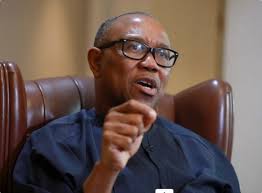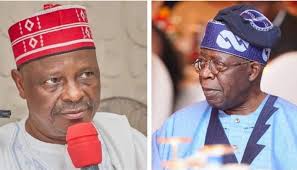
2027 elections will test the national anthem
The truth is, I don't really care about the words in the reintroduced national anthem that some people find offensive. They see words like "tribe" and "native" as derogatory and archaic, and they think that the idea of a nation where people stand "in brotherhood" bespeaks its female gender as alien to its body politic. To be honest, none of that bothers me. I don't really care about the idea that Nigeria is a "motherland," either; if Nigeria is a mother, she must be worn out from giving without replenishment. The anthem's imagery of familyhood doesn't really resonate with me. Some critics find the national anthem's provenance offensive, but I don't care about that. Neither do I find it offensive.
I think it's hilarious that the anthem's stated goal is to promote a united country where everyone is welcome. Now, that ideal will be swiftly abandoned in the next election cycle because it is not only unduly idealistic. The fierce rivalry and polarisation that characterise our general elections will overcome any charming phrases in that anthem. The song of allegiance to Bola Tinubu, "on your mandate we shall stand," strikes me as a far more sincere selection for Nigeria's national anthem than the absurdity of "Nigeria we hail thee," which will fall apart as the general elections draw near.
Y elections? What other national occasion, though, makes us unleash our inner beasts? This is what our democracy solely boils down to, the ultimate determinant of our political personhood. For the political class, elections are a do-or-die affair because they calibrate their social relevance. You either deliver your constituency, or you die. To be a dead politician does not mean you stopped breathing. It simply means you cannot pull the required weight during an election season. For the underclass, the so-called “masses,” winning an election is imperative too. Elections do not guarantee that your material conditions will improve, but winning is a symbolic victory over other identity groups in the country.
We can still recall the triumphalism of Bola Tinubu’s supporters this time last year. Some were happy their tribe won; others celebrated their religion as the winner. Such joy is the sum total of their dividend of democracy. Democracy is a quadrennial cycle of conquest, the time we get to beat down the others wallowing in the same dysfunction as us for momentary self-validation. Anyone who thinks all of that sentiment will evaporate simply because the national anthem has a line about “tribes and tongues” has got another think coming.
The old national anthem "describes us better" and "we are one and one Nigeria," according to Tinubu, who made this comment in a pre-presidency interview. Ironically, ethnic division was deliberately promoted as a successful tactic in the election that gave Tinubu the power to alter the national anthem and have his way. Although our collective memory can be very short, I don't believe anyone could have forgotten the unpleasant details of their actions so quickly. Mr. "We Are One And One Nigeria" never criticised his attack dogs in public. They tore loose, biting the soft skin of a country already in turmoil with their ravenous fangs. Following the election, Tinubu designated one of those e-hounds, Bayo Onanuga, as his media spokesperson. Such contradiction is their MO. They will gaslight you by preaching against toxicity in the same breath they use to spread it. Now that the Tinubu boys know that the current national fetish is “unity,” their new madness will be public payments of lip service to this idol.
Tinubu himself has been a politician enough to know that there are words, and there are also words without power. Uttered words can indeed have a perlocutionary effect if the circumstances around the speaker provide the necessary integrity. Without such galvanising context, words are just words, lacking any pronunciatory effect. Singing about building a nation “where no man is oppressed” in a country where the military can detain and torture you just because you wrote an article that one small big man in Aso Rock finds offensive is enough to douse whatever passion the anthem is supposed to inspire. For people to even call for the arrest of an activist who refused to stand up while the national anthem was being played means those clowns have not bothered to digest the anthem. Yet, they somehow expect the song to instigate unquestioning genuflections of loyalty. That anthem and the sense of national unity it is expected to foster is an intriguing example of magical thinking in contemporary Nigeria.
Although the anthem uses phrases like "truth and justice," these ideas have no bearing on what it really means to be a Nigerian. These are meaningless words that impoverished schoolchildren will recite during their daily general assembly. Hardly anyone thinks the old anthem's composition has any charm that can promote unity, especially those who introduced, "debated," passed, and signed the bill for its restoration. Their nostalgia was so strong that they insisted on its reintroduction. And what do you expect from elderly men who have long since dreamed their last dreams due to their crippled minds?
Indeed, the 2027 election may come too soon for the virtues they wish to emphasise through the anthem hits the road of the Nigerian political system. With the way people have been severely impoverished by the poorly conceived and ill-executed policies of this administration, do not be surprised if they testily peck at each other’s intestines earlier. By 2027, the All Progressives Congress will start fuelling and harvesting that toxicity to rally its supporters. Given their administrative missteps so far, it is not that hard to forecast how the next three years will go. It will be virtually impossible for them to sell Tinubu’s second term based on his performance, and they will need to fall back on their old gimmicks of ethnic and religious divisiveness.
You can expect that sometime in 2026, the agenda will start agending. Seemingly out of the blue, someone will restart the stale conversation about “Lagos is no man’s land” and the usual idiots will fall in line. Their choristers, presently buried in the sewers of social media, will be activated in their sleeper cells with chants of “Yoruba ronu!” Another clown will come up with a “Christianisation” agenda to mobilise Muslims who might have become disillusioned with a Muslim-Muslim presidency. Even though the present administration would not have done anything significant for Muslims, they will still stir religion by reminding Muslims of the possible loss of the presidency in which they at least get to claim some symbolic power.
When the energised political parties gather to cast their ballots, you know what no one will care about? Yes, the principles of national cohesion in spite of various "tribes and tongues." We will always harbour a distant fantasy of a "nation where no man is oppressed" and "peace and plenty" in the future. The next time you hear it will be during the swearing-in, when it will be once more contorted as a pointless national rite; the things we would be fooled into believing and are expected to mindlessly repeat like a digital voice assistant. Had the proponents of the national anthem really thought it could foster a sense of unity among the populace, they would have approached the entire endeavour with a far more positive outlook. They were subpar because, like the majority of us who will now regrettably be forced to mouth meaningless words, they are extremely pessimistic about the Nigerian project as a whole.





